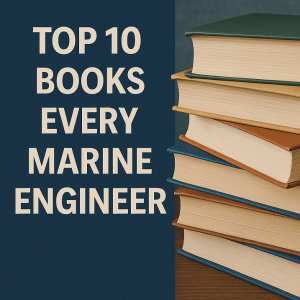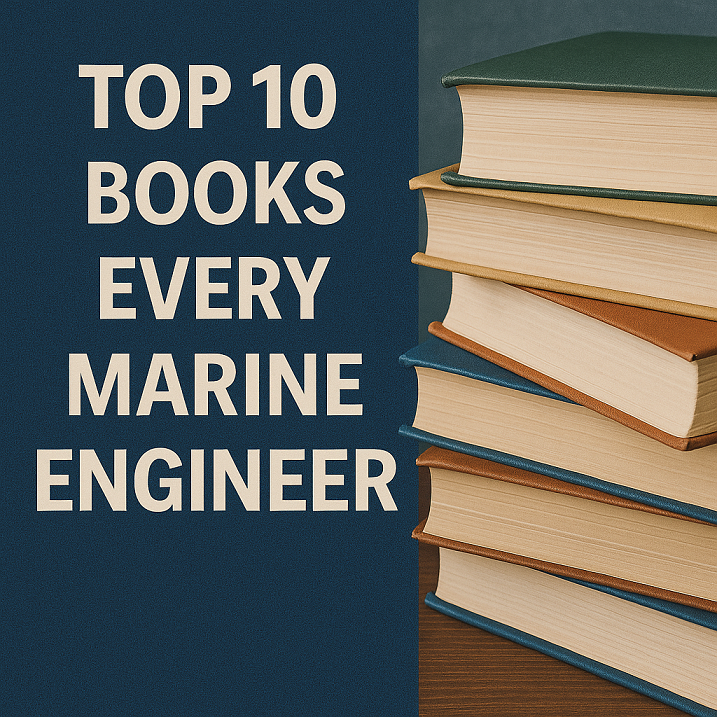Explore the top 10 essential books every marine engineer should read. From practical guides to technical deep dives, these resources will anchor your success in the engine room and beyond.
Why Foundational Books Still Matter in the Age of Smart Shipping
The engine room is evolving. Digital diagnostics, alternative fuels, and smart propulsion systems are changing how marine engineers work. Yet amid these rapid changes, the fundamentals remain essential—thermodynamics, fluid mechanics, combustion, and marine electrical systems still form the backbone of the profession. While hands-on experience is irreplaceable, books offer what no simulator or online course can: a deep dive into the underlying principles and the collected wisdom of decades of operational insight. A good marine engineering book doesn’t just teach you how systems work—it prepares you to troubleshoot, lead, and innovate under pressure.
Whether you’re a cadet entering the maritime industry or a seasoned engineer preparing for your Class 1 exam, this curated list of books provides the essential technical, operational, and professional knowledge you need.

Top 10 Books Every Marine Engineer Should Read
1. Marine Diesel Engines by Nigel Calder
This modern classic is often referred to as the bible of diesel mechanics for small to mid-size marine vessels. While it’s popular among yacht engineers and technicians, the depth of explanation makes it a powerful reference for engine room officers as well.
Why It Matters: Calder bridges the gap between theory and practice, explaining everything from fuel injection to emissions controls with clarity and insight.
📘 Available from Bloomsbury Publishing
2. Lamb’s Questions and Answers on the Marine Diesel Engine by S. Christensen
This is the go-to resource for exam preparation and oral assessments. It’s used extensively by marine academies and covers IMO-standard questions.
Strengths: Practical, concise, and closely aligned with STCW and Class exam syllabi.
Case Study: A UK cadet preparing for his MCA Engineering Oral cited Lamb’s Q&A as the most useful resource, saying, “It predicted 80% of what I was asked.”
📘 Publisher: Butterworth-Heinemann
3. Marine Auxiliary Machinery by H.D. McGeorge
This essential text covers everything beyond the main propulsion system—pumps, steering gears, air compressors, and refrigeration systems.
Use Case: Engineers preparing for Class 2 and 1 exams consistently refer to this book for detailed understanding of auxiliary systems.
Update Note: The 7th edition includes modern automation systems and environmental considerations.
📘 Routledge Maritime Engineering
4. Introduction to Marine Engineering by D.A. Taylor
This foundational text is recommended by many maritime training institutions for cadets and junior engineers.
Why It’s Valuable: It starts from first principles, making it ideal for newcomers, yet includes enough technical depth to remain a long-term reference.
Exam Tip: This is often cited in OOW and Engineering Officer exam reading lists.
📘 Publisher: Butterworth-Heinemann
5. Marine Engineering Practice by The Institute of Marine Engineering, Science & Technology (IMarEST)
A compilation of real-world case studies, this multi-volume set explores operational scenarios such as fuel contamination, exhaust failure, and lube oil system malfunctions.
Audience: Senior engineers and technical superintendents.
Insight: Think of this as the bridge between theory and real-world practice. Each chapter reads like a debriefing of actual shipboard incidents.
6. The Motorship Guide to Marine Propulsion
A specialized publication-turned-reference-guide that addresses modern propulsion trends, including dual-fuel systems, hybrid power, and shaftless solutions.
Relevance: Crucial for marine engineers working on LNG carriers or future-fueled vessels.
Technological Focus: Discusses recent developments in marine electrification and IMO-compliant emissions reduction systems.
7. Diesel Engine Reference Book by Bernard Challen and Rodica Baranescu
A heavyweight academic resource used in both marine and automotive diesel engine education.
Technical Depth: Thermodynamics, fluid dynamics, combustion modeling, and emissions calculations—ideal for engineers with a strong technical bent.
Application: Excellent for engineers involved in R&D, or those transitioning to classification society roles.
📘 Publisher: Butterworth-Heinemann
8. Ship Stability for Masters and Mates by D.R. Derrett
Though technically focused on navigation, this book is critical for marine engineers preparing for senior roles or dual certifications.
Why Engineers Need It: Understanding the vessel’s stability is crucial for ballast management, bunkering, and engine room damage control scenarios.
Educational Use: Often cited in STCW Class 1 syllabi.
9. Rules and Regulations for the Classification of Ships (Lloyd’s Register / DNV)
Engineers must be familiar with classification standards. These are living documents, updated annually, governing everything from welding quality to vibration limits.
Pro Tip: Download the latest digital versions from:
10. Modern Marine Engineer’s Manual (Volumes I & II)
This U.S. publication is a staple on many ships and marine engineering campuses.
Content: Covers everything from electrical distribution to refrigeration and turbocharger performance.
Why It Endures: Decades-old but still updated regularly. It remains one of the most comprehensive marine engineering resources in print.
📘 [Published by Cornell Maritime Press]
Real-World Impact: How Books Shape Maritime Competence
Case Study: Avoiding Engine Room Fire with Procedural Insight
A third engineer aboard a chemical tanker in Singapore recalled using Marine Auxiliary Machinery to troubleshoot an overheated lube oil pump. His prompt action, based on knowledge from the book, averted a major fire incident.
Case Study: Career Advancement through Self-Education
A cadet in Ghana passed his Class 2 license using just three core books: Lamb’s Q&A, Taylor’s Introduction, and Calder’s Diesel Engines. He now mentors fellow cadets using simplified summaries from these texts.
–
Frequently Asked Questions (FAQ)
Q1: Are these books useful for STCW exams?
A: Yes. Books like Lamb’s Q&A, Taylor’s Introduction, and Marine Auxiliary Machinery directly align with STCW syllabus requirements and Class exams.
Q2: Do I need to buy all 10 books?
A: Not necessarily. Start with 2–3 core titles relevant to your career stage (e.g., Calder and Taylor for cadets, IMarEST Practice and Classification Rules for senior engineers).
Q3: Are digital versions available?
A: Most are. Platforms like Elsevier, Taylor & Francis, and Amazon Kindle offer eBooks or PDF formats.
Q4: How often should I update my reference library?
A: Every 3–5 years or when preparing for a higher certification level. Always check for revised editions.
Q5: What about newer areas like LNG and green propulsion?
A: Books like The Motorship Guide and technical papers from DNV or IMO publications cover emerging technologies.
Q6: Are any of these free?
A: Classification society rules (e.g., DNV, LR) and some IMO documents are available freely online. Most books require purchase or academy access.
Q7: Can I use these for oral exam preparation?
A: Absolutely. Books like Lamb’s Q&A and IMarEST Practice are specifically structured to simulate oral questioning formats.
–
Conclusion
Marine engineers are expected to be more than mechanics—they must be diagnosticians, crisis managers, and compliance specialists. The books listed here will not only help you pass exams but also shape your mindset as a problem-solver and leader in the engine room.
Whether you’re studying for your next license, stepping into a chief role, or simply staying updated in an ever-evolving industry, these texts will help you chart a steady course.
📚 Ready to expand your engineering toolkit? Explore maritime certifications, training programs, and more at MaritimEducation.com.
References
-
International Maritime Organization. (2023). STCW Convention and Code. https://www.imo.org
-
IMarEST. (2024). Marine Engineering Practice Series. https://www.imarest.org
-
Lloyd’s Register. (2024). Rules and Regulations. https://www.lr.org
-
DNV. (2024). Ship Classification Standards. https://rules.dnv.com
-
Butterworth-Heinemann. (2024). Marine Engineering Titles. https://www.elsevier.com

